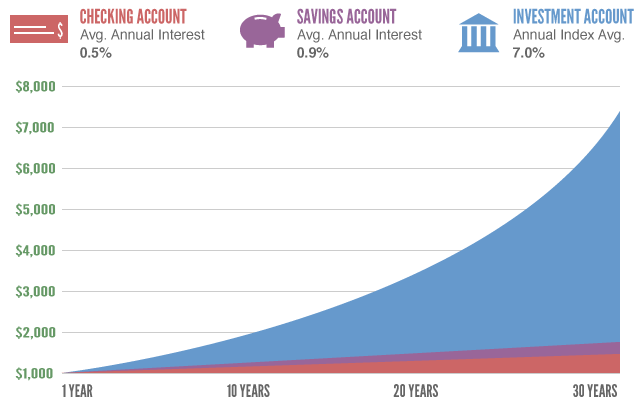
If you’re anything like me, your parents probably always told you to learn how to save your money. I was always curious as to the battle of saving versus investing at a young age, but never knew for sure what I should do. For years, I had a savings account that I’d throw some money into for the purpose of having extra money one day when I wanted to buy something, or when I needed it for an emergency. However, very seldom are we told we should invest our money at a young age because it’s “risky.”
College students are notorious for being broke – we spend our only bit of money on food and booze, leaving a lot of us with little to save or invest with. Worse yet, so much of our time is spent studying, partying, or just relaxing for a few minutes that many of us don’t have the time to work.
However, that’s not the case for everyone. For myself personally, I work for myself and make money online to help pay for my bills and to have some extra spending money. The extra money I make is normally invested, but not always in such traditional ways. Very little of the money I bring in is saved, but there are some exceptions.
So, now you may be asking yourself the benefits of saving versus investing. They both have their benefits and drawbacks, but let’s dive deeper to find the best option for you.
Looking for some ways to make extra money while in school or even while you’re working? Check out this article for some great side hustles to bring in extra cash!
Why Save
As you’ll find out a bit later in this article, I’m not a huge fan of saving when investing is an option. However, as I also mentioned, I think there are some exceptions.
One of the most important reasons to save some money is in case anything goes wrong. You never know when you may find yourself without any money in your checking account when you need it most.
For example, suppose you’re driving home for a break, or something urgent comes up where you find yourself in need of a few extra hundred dollars. Some people call this a “rainy day” fund, but it all means the same thing. There will be days when you need extra money, and this is one of the primary reasons to have something saved up.

If you don’t already have some money saved up, I’d recommend throwing in a small amount on a regular basis – something small like $10 per week if you can swing it. This way, it will make sure that you’re not strapped for cash in your primary checking account, but it’s also helping to slowly grow your savings account.
Find a set amount that you want to have saved up by a certain date and shoot for that. It could be as small as a hundred dollars or so, and up to a thousand dollars. However, if you have more than $1,000 saved up, I’d personally suggest starting to invest that, but we’ll talk more about that later.
Where Should You Save?
The most basic answer to this question is in a savings account. If your primary purpose is to have some money sitting around that is easily accessible, your best bet is a savings account. However, there are other great places to save your money.
I’m sure you’ve heard of apps like Acorns, which is a system that allows you to save your money in a unique manner (and invest it if you choose). Essentially, you can choose an amount to put in, either in sporadic bursts when you have the money or a set amount every week/month, etc.
What’s so interesting about an app like Acorns, though, is that you can choose to connect your credit or debit card to it and save even more. Suppose you purchase something that’s $6.49 – if you connect your card through Acorns, it will take that extra $0.51 and round the purchase up to the next whole dollar and put it in your savings.
Through doing this, it is a minimal amount of money you otherwise wouldn’t even think about that gets saved for you.
There are a ton of apps like this that allow for similar actions, but if you’re looking for a different way to save, check some of them out here.
Many of these types of apps allow you to choose a way to invest your savings too, which is great. While you shouldn’t expect massive gains if you are only planning on saving a few hundred dollars, it’s still a unique way to go about saving and will likely offer more than a traditional savings account over time.
Why Invest
While saving is great, something that I personally recommend doing to an extent, investing is still the smartest option. Luckily, you can do a mix of both, but I would not be saving every single penny I made if I was you. Instead, even while in college, I recommend investing a good portion of your extra cash in some way or another.
One of the most common misconceptions is that investing isn’t possible with such little money, which in my opinion, is why such few college students choose to invest.
If you’re anything like most college students who may not have an excess of wealth to invest, check out this article I wrote about ways to invest with less than $100. It goes over unique ways to invest your money instead of just throwing it in the stock market.
However, if you’re not feeling up to trying some unique investment ideas and want to be a little “safer” with your money, investing in the stock market and mutual funds are a great way to do it.
Investing in the Stock Market
I’ll talk about this more in future blog posts and podcasts, but I think the stock market is something that everyone – especially young people in college – should learn about. When it comes to saving versus investing, the stock market is a great investment option.
The reason I think this is because the stock market is always going to be around, and year-over-year, it proves to provide relatively consistent gains assuming there’s no recession. On average, an investor makes around 8-10% on their money every year when investing in the stock market.
This does not mean I think you should go pick a random stock and put all of your money into it. Instead, I recommend that you put some of your money into the overall stock market that represents the United States economy – especially during times of market growth.

For the rest of your money, begin looking into how to pick out the right types of stocks to invest in. Are you someone who’s willing to take on more risk? Or are you someone who prefers a slower and steadier growth portfolio? This will inevitably determine the type of investing you are going to do and what type of stocks you should put your money into.
Some people even find success in day-trading or swing-trading stocks. However, I would not really call this investing, and hence, I don’t want to dig too far into that in this article. Albeit, it can be a unique way to generate income with enough effort.
No matter what you decide you want your risk tolerance to be when investing, just be sure to do your research before blindly investing in anything – especially in the stock market. If your plan is to hold long term, which it should be if you’re investing, be sure you have faith in the company you’re investing in through research. Just because you think the company is great from what you see on the internet doesn’t mean it is great. Read up on it a bit more and see how they’re really doing. Here are some great ways to do research on a stock!
The Verdict
If you are only going to choose one between saving versus investing, choose to invest. The beauty of investing, especially in something like the stock market, is that you can take your money out extremely quickly if you are to need it. In a sense, it is almost like a savings account that you have control over what to do with the money in it.
However, if you have the funds to both save and invest, I would highly recommend doing this. As mentioned earlier, set a certain amount of money that you will have available on a weekly basis and set it in a savings account. Develop a goal amount that you want to have saved up by a certain time frame and build towards it.

If you have extra money besides that, your best bet is to learn how to invest it. This is something we will talk a bit more about in future blogs and podcasts, but this is a great beginner’s guide to learning how to invest your money in the stock market as a beginner.
Overall, I think financial literacy is something that too many people forget about and that not enough college students care to learn about. In reality, though, you give yourself a much better edge with any type of financial knowledge in today’s world. Through saving and investing, I feel as though you will gain a much better understanding of money as a whole. While you may not necessarily become a millionaire off these in college, it will greatly help your future.
Again, saving and investing might not make you rich right now. In fact, neither of them likely will, especially if you’re investing in the stock market with little money. However, the lessons they will teach you about finances and dealing with money in the future are invaluable.
Just because you’re in college shouldn’t mean you can’t save or invest. Do them both now while you have the time and ability to learn to help build your future!
Like this content? Be sure to check out the blog and podcast episodes on GoodStrongMen.com for more!